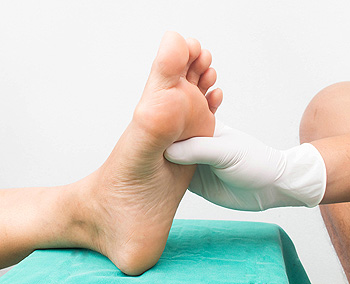Items filtered by date: March 2024
Are You Suffering From Ingrown Toenails?
3 Common Causes of Foot Pain

Feet, often overlooked until they begin to ache, play an important role in living a normal life. Three common causes of foot pain include tarsal tunnel syndrome, plantar fasciitis, and metatarsal pain. Tarsal tunnel syndrome involves compression of the tibial or plantar nerves within a passageway in the foot. This type of compression causes pain along the inner ankle and sole. Plantar fasciitis is the result of inflammation of the tissue on the sole of the foot that supports the arch. It results in heel pain and stiffness, particularly after periods of rest or activity. Metatarsalgia, or pain in the ball of the foot is often caused by activities that involve running and jumping. There are other causes as well, including foot deformities and shoes that are too tight or too loose. Addressing these types of foot pain requires a tailored approach, ranging from orthotic inserts and physical therapy to lifestyle adjustments and proper footwear. For help with foot pain, it is suggested that you make an appointment with a podiatrist.
Foot Pain
Foot pain can be extremely painful and debilitating. If you have a foot pain, consult with one of our podiatrist from North Texas Podiatry Associates. Our doctors will assess your condition and provide you with quality foot and ankle treatment.
Causes
Foot pain is a very broad condition that could be caused by one or more ailments. The most common include:
- Bunions
- Hammertoes
- Plantar Fasciitis
- Bone Spurs
- Corns
- Tarsal Tunnel Syndrome
- Ingrown Toenails
- Arthritis (such as Gout, Rheumatoid, and Osteoarthritis)
- Flat Feet
- Injury (from stress fractures, broken toe, foot, ankle, Achilles tendon ruptures, and sprains)
- And more
Diagnosis
To figure out the cause of foot pain, podiatrists utilize several different methods. This can range from simple visual inspections and sensation tests to X-rays and MRI scans. Prior medical history, family medical history, and any recent physical traumatic events will all be taken into consideration for a proper diagnosis.
Treatment
Treatment depends upon the cause of the foot pain. Whether it is resting, staying off the foot, or having surgery; podiatrists have a number of treatment options available for foot pain.
If you have any questions, please feel free to contact our offices located in Euless and Southlake, TX . We offer the newest diagnostic and treatment technologies for all your foot care needs.
Causes and Risk Factors for Toe Cramps

Toe cramps are sudden and involuntary muscle contractions that can cause severe pain and immobility. Cramps in the toes, which occur when muscles contract and fail to relax, commonly occur at night. Toe cramps can be triggered by dehydration, electrolyte imbalance, tight footwear, and prolonged body positions, particularly in high-heat conditions. Underlying health issues like arteriosclerosis, which restricts blood flow to the extremities, can also contribute to toe cramps. Certain demographics, including athletes, older adults, and pregnant women, are more likely to experience recurring cramps due to muscle fatigue, age-related muscle loss, and hormonal changes. Toe cramps are generally treatable through certain lifestyle adjustments, increased hydration, and gentle stretching. However, if they continue or get worse, it is suggested that you schedule an appointment with a podiatrist. This foot doctor is medically trained to perform a detailed exam and health history to determine the underlying cause of this condition. A podiatrist then can offer the appropriate treatment solutions.
Toe pain can disrupt your daily activities. If you have any concerns, contact one of our podiatrist of North Texas Podiatry Associates. Our doctors can provide the care you need to keep you pain-free and on your feet.
What Causes Toe Pain?
Most severe toe pain is caused due to a sports injury, trauma from dropping something heavy on the toe, or bumping into something rigid. Other problems can develop over time for various reasons.
Toe pain can be caused by one or more ailments. The most common include:
- Trauma
- Sports injury
- Wearing shoes that are too tight
- Arthritis
- Gout
- Corns and calluses
- Hammertoe
- Bunions
- Blisters
- Ingrown toenails
- Sprains
- Fractures (broken bones)
- Dislocations
When to See a Podiatrist
- Severe pain
- Persistent pain that lasts more than a week
- Signs of infection
- Continued swelling
- Pain that prevents walking
Diagnosis
In many cases the cause of toe pain is obvious, but in others, a podiatrist may want to use more advanced methods to determine the problem. These can range from simple visual inspections and sensation tests to X-rays and MRI scans. Prior medical history, family medical history, and any recent physical traumatic events will all be taken into consideration for a proper diagnosis.
Treatment
Treatments for toe pain and injuries vary and may include shoe inserts, padding, taping, medicines, injections, and in some cases, surgery. If you believe that you have broken a toe, please see a podiatrist as soon as possible.
If you have any questions please feel free to contact our offices located in Euless and Southlake, TX . We offer the newest diagnostic tools and technology to treat your foot and ankle needs.
Causes of Achilles Tendon Pain

Achilles tendonitis affects the Achilles tendon, which connects the calf muscles to the heel bone. Overuse or strain of the Achilles tendon can lead to inflammation and irritation, causing symptoms such as pain, tenderness, stiffness, and decreased strength and flexibility in the affected leg. This condition may develop gradually over time or suddenly during physical activity. In severe cases, Achilles tendonitis can progress to a partial or complete tear of the tendon. This results in more intense symptoms, like sharp pain, swelling, bruising, difficulty standing on tiptoe, or problems pointing the foot downward. Seeking prompt medical evaluation is important if you suspect Achilles tendonitis or experience symptoms of a tendon tear. Imaging tests, including ultrasound, X-rays, or MRI scans can confirm the diagnosis and determine the extent of the injury. If you are experiencing persistent symptoms of Achilles tendonitis, it is suggested that you make an appointment with a podiatrist for an exam, a diagnosis, and treatment options.
Achilles tendon injuries need immediate attention to avoid future complications. If you have any concerns, contact one of our podiatrist of North Texas Podiatry Associates. Our doctors can provide the care you need to keep you pain-free and on your feet.
What Is the Achilles Tendon?
The Achilles tendon is a tendon that connects the lower leg muscles and calf to the heel of the foot. It is the strongest tendon in the human body and is essential for making movement possible. Because this tendon is such an integral part of the body, any injuries to it can create immense difficulties and should immediately be presented to a doctor.
What Are the Symptoms of an Achilles Tendon Injury?
There are various types of injuries that can affect the Achilles tendon. The two most common injuries are Achilles tendinitis and ruptures of the tendon.
Achilles Tendinitis Symptoms
- Inflammation
- Dull to severe pain
- Increased blood flow to the tendon
- Thickening of the tendon
Rupture Symptoms
- Extreme pain and swelling in the foot
- Total immobility
Treatment and Prevention
Achilles tendon injuries are diagnosed by a thorough physical evaluation, which can include an MRI. Treatment involves rest, physical therapy, and in some cases, surgery. However, various preventative measures can be taken to avoid these injuries, such as:
- Thorough stretching of the tendon before and after exercise
- Strengthening exercises like calf raises, squats, leg curls, leg extensions, leg raises, lunges, and leg presses
If you have any questions please feel free to contact our offices located in Euless and Southlake, TX . We offer the newest diagnostic tools and technology to treat your foot and ankle needs.
Numbness in the Feet From Running

Numbness in the toes or feet during running can arise from various factors, including wearing ill-fitting shoes or tightly laced shoelaces that compress nerves. Adjusting shoe size or loosening laces can alleviate pressure. Issues with running gait, such as over-striding, may also contribute to foot numbness as shorter strides can help reduce strain. Overexertion without adequate breaks, in addition to dehydration from excessive fluid loss through sweat, may contribute to numbness. Muscle tightness, especially surrounding the sciatic nerve, can compress the nerves in the feet, resulting in numbness. Flat arches also increase pressure on nerves and blood vessels, potentially leading to numbness. Medical causes, such as peripheral neuropathy, Morton's neuroma, and peripheral arterial disease are other potential causes of numbness in the feet. If numbness persists or worsens, it is suggested that you schedule an appointment with a podiatrist for a full evaluation and treatment options.
Neuropathy
Neuropathy can be a potentially serious condition, especially if it is left undiagnosed. If you have any concerns that you may be experiencing nerve loss in your feet, consult with one of our podiatrist from North Texas Podiatry Associates. Our doctors will assess your condition and provide you with quality foot and ankle treatment for neuropathy.
What Is Neuropathy?
Neuropathy is a condition that leads to damage to the nerves in the body. Peripheral neuropathy, or neuropathy that affects your peripheral nervous system, usually occurs in the feet. Neuropathy can be triggered by a number of different causes. Such causes include diabetes, infections, cancers, disorders, and toxic substances.
Symptoms of Neuropathy Include:
- Numbness
- Sensation loss
- Prickling and tingling sensations
- Throbbing, freezing, burning pains
- Muscle weakness
Those with diabetes are at serious risk due to being unable to feel an ulcer on their feet. Diabetics usually also suffer from poor blood circulation. This can lead to the wound not healing, infections occurring, and the limb may have to be amputated.
Treatment
To treat neuropathy in the foot, podiatrists will first diagnose the cause of the neuropathy. Figuring out the underlying cause of the neuropathy will allow the podiatrist to prescribe the best treatment, whether it be caused by diabetes, toxic substance exposure, infection, etc. If the nerve has not died, then it’s possible that sensation may be able to return to the foot.
Pain medication may be issued for pain. Electrical nerve stimulation can be used to stimulate nerves. If the neuropathy is caused from pressure on the nerves, then surgery may be necessary.
If you have any questions, please feel free to contact our offices located in Euless and Southlake, TX . We offer the newest diagnostic and treatment technologies for all your foot care needs.

